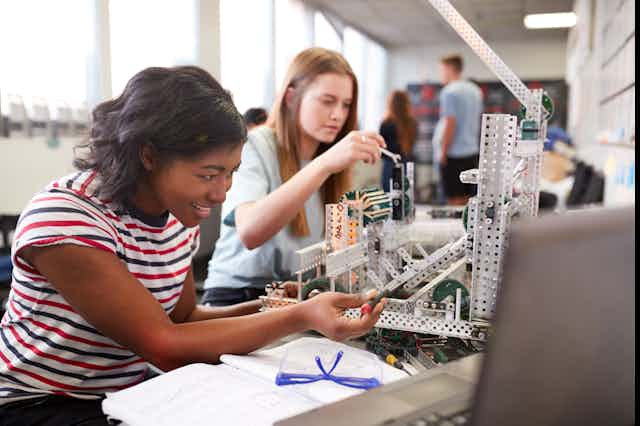The scale, pace and breadth of technological development in artificial intelligence, robotics, computing, biotechnology, materials science and beyond have ushered in the Fourth Industrial Revolution.
In an interview with journalist Thomas Friedman, Google executive Eric Teller argues that humanity’s 21st century challenge is to become as good at shaping the positive impacts of technologies as we are at inventing the technologies in the first place. Teller says the problem is that the political, economic, legal, organizational and educational systems in which we operate are not agile enough to respond to the scale and pace of technological change.
My professional life is focused on how to educate aspiring engineers to be agile. I teach ethics, professionalism and communication in the Faculty of Engineering and Applied Science at Memorial University. My background in the humanities trained me to consider the social and ethical implications of engineering and technological development.
Technology in service
It’s crucial to bring a sense of social and environmental responsibility to budding designers and engineers, but how? For one thing, we need a new paradigm for thinking about and designing technology.
One such paradigm is offered by technological stewardship, which refers broadly to “behaviour that ensures technology is used to make the world a better place for all: more equitable, inclusive, just and sustainable.”
Technological stewardship was originally put forward by the Engineering Change Lab (ECL), a national initiative launched in collaboration with Engineers Canada, Engineers Without Borders and other university, private and public sector partners. ECL has been hosting workshops across the country to encourage deeper conversations about the role engineering should play in guiding the development of technology.
Technological stewardship calls for those who create and influence technology to adopt a more responsible leadership role, arguing for an expansion in how engineers and others see their contributions. Stepping up to that role also involves expanding who participates in decisions about technological design and propagation and which perspectives are considered in design decisions.
The ECL offers Technological Stewardship Principles that describe clear yardsticks for actions, structures, decisions and results. The principles identified by the ECL embody values such as collaboration, inclusivity and responsibility.
Other than the ECL, there has been a proliferation of principle-based declarations about the use of AI and other powerful and potentially disruptive technologies. These include the Canadian Tech for Good Declaration and the Safe Face Pledge sponsored by the Algorithmic Justice League at the Massachusetts Institute of Technology.
Critical conversations
Cynics might see pledges and declarations to be meaningless window dressing, but I see value in those attempts to think more critically about technology. Such conversations are signs of our collective and sincere willingness to express what we value while also being agile in the face of profound change.
Those conversations are crucial in engineering schools, yet a provocative study suggests that engineering students may actually experience a decrease in social and political concern over the course of their professional education. University of Michigan sociologist Erin Cech refers to this as a culture of disengagement that undergirds many engineering programs.
But even here there are signs of change: the National Council of Deans of Engineering and Applied Science recently adopted the Calgary Declaration of the Future of Engineering Education. Among other things, this expresses many of the principles associated with technological stewardship.
My home institution of Memorial University is in the midst of incorporating the principles of technological stewardship into our curriculum, from the first year experience up through to graduation. In partnership with ECL we are aiming to move the needle further in a direction that ensures that technology is made to be as beneficial as possible.
Valuing stewardship
As an educator, I would like to see technological stewardship enacted broadly in more student engineering competitions like SpaceX’s Hyperloop challenge. I sit on the advisory committee for our university’s Paradigm Hyperloop team. The only criterion for winning the competition is being the fastest pod. The team has allowed me to create some space to consider how their design fits into a bigger picture: Who would have access to this mode of transportation? Who benefits? Who gets left out? The competition doesn’t credit them yet for thinking about these questions.

If we are serious about technological stewardship in the Fourth Industrial Revolution, design competitions could be an effective way to plant those seeds.
The concept of technological stewardship is still in development, but members of the Engineering ChangeLab want to help spark a national conversation not just among engineering professionals and educators, but society at large. At the cusp of the Fourth Industrial Revolution, that conversation matters more than ever before.
[ You’re smart and curious about the world. So are The Conversation’s authors and editors. You can read us daily by subscribing to our newsletter. ]

